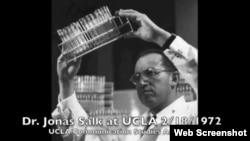The 1960s was an era of change and turmoil for the United States and other parts of the world. The changes ranged from social attitudes to politics and even science. This period in history can now be heard on YouTube through the voices of prominent figures who spoke at the University of California, Los Angeles, or UCLA. Their recorded speeches were buried and forgotten for years, until recently.
From entertainers, to astronauts to world leaders, hundreds of people who shaped the 1960s and early 1970s gave speeches at the University of California, Los Angeles that were recorded.
Chair of the Communications Department Tim Groeling says the speeches present an audio snapshot of a significant time in history.
"It’s the combination of this being, I think, dramatic figures speaking at what was really a dramatic time," he said. "I mean this is the time period where society is really changing.”
Hundreds of speeches reflecting social and political changes and new discoveries in scientific knowledge were recorded, locked in file cabinets and forgotten until recently, when Groeling made a discovery.
“I was at a thrift store and saw an old reel-to-reel [audio tape player] unit for 20 bucks [$20]," he said. "I’m like, 'I bet you that fits with the tapes, and [for] 20 bucks [I] might as well give it a shot [buy it]."
Once he had the old audio tape player, Groeling solicited the help of former student Derek Bolin to digitize the speeches made between 1962-1973.
“I felt very good about doing this because I felt like I was preserving a piece of history,” he said.
In a 1972 speech, actress Jane Fonda spoke at an anti-Vietnam War rally on campus, reflecting the sentiment of the time.
"At a time when there are 400,000 people in prison in South Vietnam for speaking out for peace, independence and democracy in South Vietnam, I think the least we can do is to close down our schools and universities," she said."... I don’t feel that Nixon and the people that work with him represent the interests of any of us, be we men, women, black, white, yellow, Chicano or brown."
Yitzhak Rabin spoke at the university while he was Israeli ambassador to the United States. He later became prime minister and was assassinated in 1995. In 1968, he spoke to UCLA students about the challenges of achieving peace between Israel and the Arab nations.
"I’m not very optimistic about the prospects of achieving peace in the near future, for two main reasons," Rabin said. "I don’t believe Egypt or the ruler of Egypt wants peace, and he has got his own reasons that derives from his ambitions to take over the Middle East, and Israel serves as a barrier between him, between Egypt and other Arab countries. But more than that, he has found great support in one of the super powers, in the Soviet Union."
The speeches went beyond world politics. Jonas Salk, who developed the polio vaccine, gave a speech in 1972 about that period in time as significant in the history of science.
"The world is going through very interesting changes now, and changes of such nature that I believe this is perhaps the most interesting time that man has ever lived, perhaps it's more interesting than will ever be true again in the future," he said.
Tim Groeling says without technology and the Internet it would be difficult for the public to hear these historical figures. There are 366 speeches now available.




